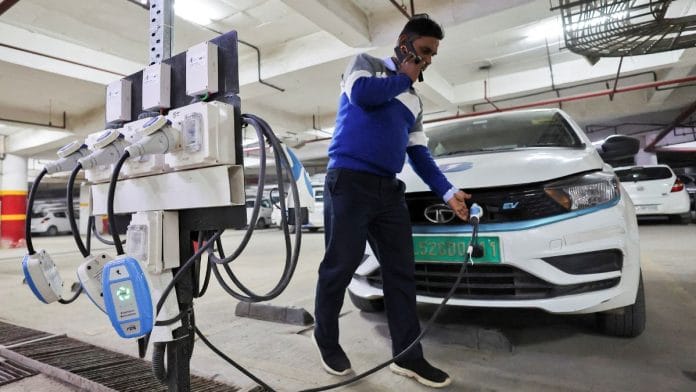Rapid digitalisation has reshaped the future of jobs across the globe. At the centre of this shift is the platform economy, which leverages technology to create flexible and part-time earning opportunities for millions. However, the Delhi government’s aggressive EV push in this sector does not align with gig workers’ demands for economic stability.
The Delhi Motor Vehicle Aggregator and Delivery Service Provider Scheme 2023 seeks to regulate the aggregators, and one of its key objectives is to promote the use of EVs by mandating a full fleet conversion to electric vehicles by 2030.
NITI Aayog estimated the size of the gig workforce in India to reach 2.35 crore by 2029-2030 from about 77 lakhs in 2020-21. Policymakers in India are increasingly recognising the significance of this burgeoning sector and establishing regulatory frameworks. However, some policy initiatives, like the one being rolled out in Delhi NCR, are worrying the industry. The scheme may be a positive step toward a more green economy, a closer look at its provisions tells a different story.
Unrealistic targets
The scheme puts the onus of EV transition on cab aggregators, delivery service providers and e-commerce entities in Delhi NCR. Most aggregators do not own the fleet of vehicles used by their drivers and delivery partners. They onboard gig workers who use their personal conveyances to undertake platform-based jobs.
Nonetheless, by mid June, aggregators have to declare details of the vehicles associated with their platforms as the EV targets kick in. For instance, the target for two-wheelers is 10 per cent EVs within six months, 25 per cent in one year, and 50 per cent within two years. To put it simply, by the end of 2030, all the entities will have to go 100 per cent electric, and they cannot accept any non-EVs for their platforms.
Industry experts say that EV penetration in Delhi has been around 10-12 per cent from 2022 to 2024. Given how the ecosystem is still at a nascent stage, the government’s EV targets appear unrealistic to the industry.
Estimates suggest that there are about 1-2 lakh gig workers in the national capital. Mandating all of them to shift to EVs can prove to be a herculean task and have irreversible impacts on their earning opportunities.
Effectively, the Delhi government is placing the burden of EV transition on the gig economy. Most of the workers are reluctant to forgo their petrol vehicles, which still have a lifespan of 10-15 years. They find the cost of EV ownership still relatively higher compared to internal combustion engine vehicles.
While Delhi has 1,900 charging stations and 2,400 charge points, they are inadequate for the gig workers who need to zip through nearly every lane in the city.
The infrastructure will need some more time to offer enough local charging points. The government’s plans to install additional 18,000 charging points by the end of this year but the gig workers would rather wait before switching to EVs. They need a charging and/ or swapping station every 2-3 kms to be able to effectively ply passengers and undertake hyperlocal deliveries.
The gig workers prefer the Low-speed Electric Vehicles (LSEVs). These are categorised as Non-Motorised Electric Bicycles under the Central Motor Vehicles Rules 1989, and are exempt from registration and licensing requirements. The gig workers are demanding they be allowed to use LSEVs in the interim because they are also more affordable. But the Delhi government has not allowed the industry to use low-speed EVs.
The industry and gig workers are annoyed by the mandate to register vehicles on the government portal. Meeting the deadline and getting all necessary documents in place will be challenging for individual owners. And if any vehicle is not registered, the aggregator company will be held liable and penalised.
Industry representatives argue that while the Delhi government held consultations before rolling out the EV scheme, their feedback and concerns were not considered. It is an important policy goal for the capital city, but the government and the industry must work out a more pragmatic approach for the gig workers.
Pranjal Sharma is an economic analyst and author of The Next New: Navigating the Fifth Industrial Revolution. Views are personal.
(Edited by Ratan Priya)






